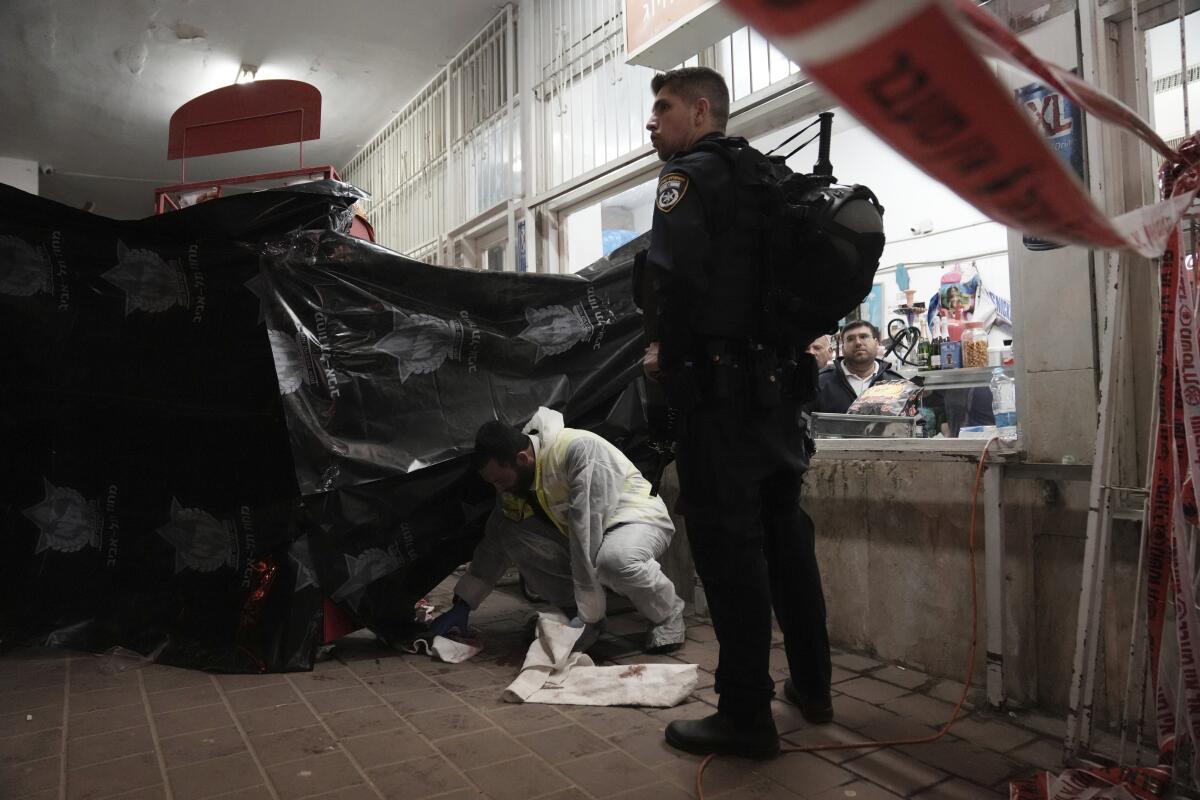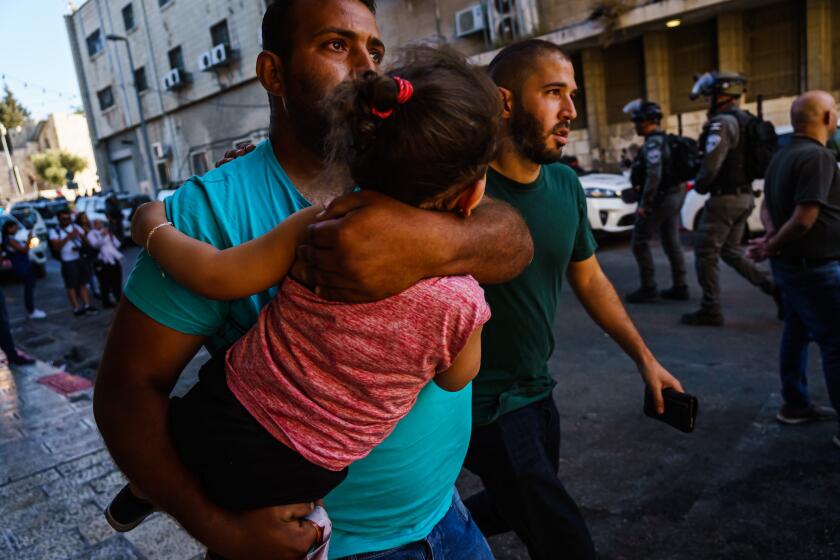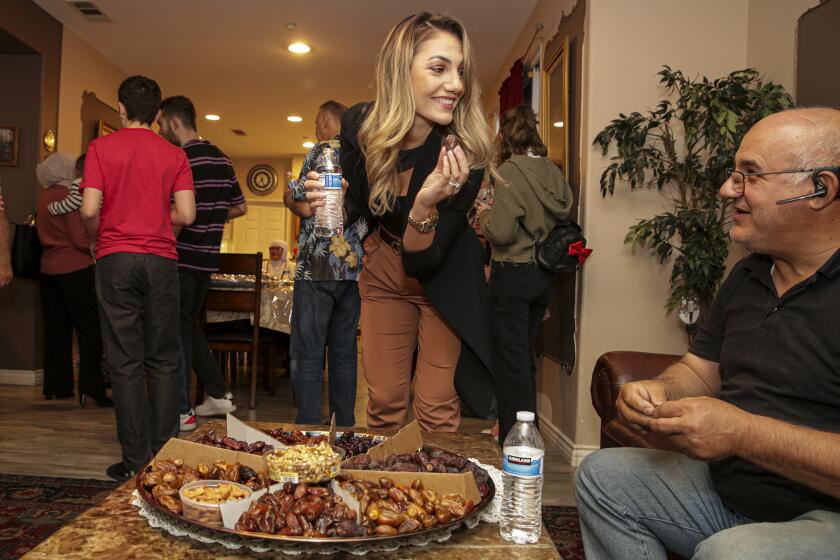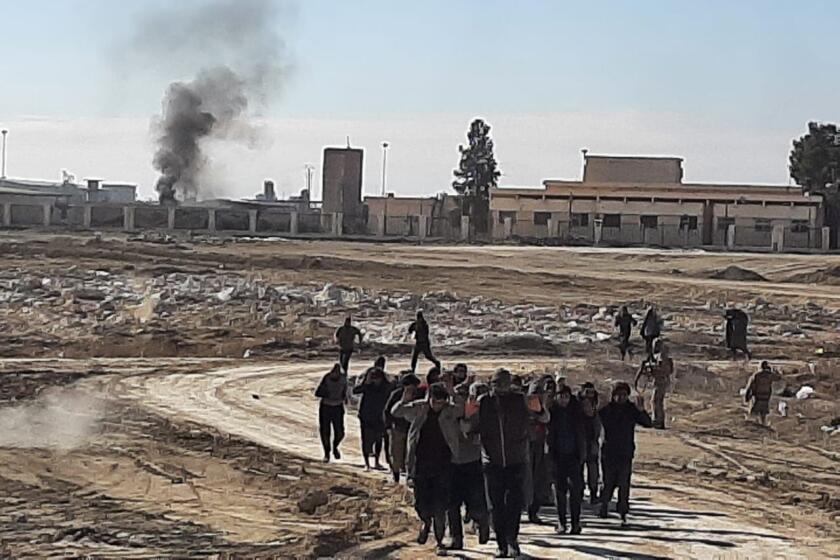Palestinian gunman kills 5 in third street attack in Israel in a week

- Share via
JERUSALEM — A gunman opened fire in a city in central Israel late Tuesday, methodically gunning down victims as he killed at least five people in the third such street attack in a week.
The shooter, who was killed by police, was identified Wednesday as Diaa Hamarsheh, 27, from the West Bank village of Yabad. Israeli authorities have arrested and are questioning five people; a group that represents current and former Palestinian prisoners said those arrested were Hamarsheh’s relatives.
The incident Tuesday was the third attack of its kind ahead of the Muslim holy month of Ramadan. The previous two assaults, carried out by Arab citizens of Israel inspired by the Islamic State extremist group, have raised concerns of further violence ahead of a sensitive period when three major Muslim, Jewish and Christian holidays converge.
Israel ramped up its security presence both in Israeli cities as well as around the occupied West Bank in a bid to prevent any further violence. Prime Minister Naftali Bennett was set to hold a meeting of his Security Cabinet later Wednesday, after convening his top security officials shortly after Tuesday’s attack.
“We are dealing with a new wave of terror,” Bennett said in a statement. “As in other waves, we will prevail.”
Amateur video footage aired on Israeli television appeared to show the gunman in a black shirt armed with an assault rifle stopping a moving vehicle and shooting the driver. Another showed him chasing a cyclist, with the gun appearing to jam as he tried to fire.
The Israel-Hamas war has helped catalyze a newfound sense of Palestinian solidarity that could mark a new moment in the Middle East, activists say.
Tuesday’s shootings occurred at two locations in Bnei Brak, an ultra-Orthodox city just east of Tel Aviv. Police said a preliminary investigation found the gunman was armed with an assault rifle and opened fire on passersby before he was shot by officers at the scene.
Authorities said five people were killed. Police said one of the victims was a police officer who arrived at the scene and engaged the shooter. Two others were Ukrainian citizens, police said. It wasn’t immediately clear whether the Ukrainians had arrived before or after Russia’s invasion of its neighbor.
In the West Bank, Palestinian Authority President Mahmoud Abbas condemned the attack, saying the killing of Israeli or Palestinian civilians “only leads to further deterioration of the situation and instability, which we all strive to achieve, especially as we are approaching the holy month of Ramadan and Christian and Jewish holidays.”
He said the violence “confirms that permanent, comprehensive and just peace is the shortest way to provide security and stability for the Palestinian and Israeli peoples.”
The humble date holds a special significance for Muslims as well as farmers in Southern California’s Coachella Valley -- considered the date capital of the United States
No Palestinian groups immediately claimed responsibility for the attack. The Islamist militant group Hamas praised the “heroic operation” but stopped short of claiming responsibility.
Israeli authorities have not yet determined whether the recent attacks were organized or whether the attackers acted individually. The Israeli military announced that it would be deploying additional troops to the occupied West Bank, and the police chief raised the national readiness level to its highest.
Israel in recent weeks has been taking steps aimed at calming tensions and avoiding a repeat of last year, when clashes between Israeli police and Palestinian demonstrators in Jerusalem boiled over into an 11-day war between Israel and Hamas, which rules Gaza.
The Israeli government planned to ease a series of restrictions on Palestinians in the West Bank and Gaza and held talks with Jordanian King Abdullah II, who made a rare visit to the West Bank this week, to try to ensure calm during what was expected to be a tense period.
Breaking News
Get breaking news, investigations, analysis and more signature journalism from the Los Angeles Times in your inbox.
You may occasionally receive promotional content from the Los Angeles Times.
But the new wave of violence is greatly complicating those efforts.
On Sunday, a pair of gunmen killed two young police officers during a shooting in the central city of Hadera, and last week, a lone assailant killed four people in a car-ramming and stabbing attack in the southern city of Beersheba.
Earlier on Tuesday, Israeli security services raided the homes of at least 12 Arab citizens and arrested two suspected of having ties to Islamic State.
Hours before the raid, Bennett said the recent assaults inside Israel marked a “new situation” that required stepped-up security measures.
More than 100 Islamic State fighters attacked a prison in northeast Syria to try to free thousands of comrades locked inside.
Law enforcement officials said 31 homes and sites were searched overnight in northern Israel, an area that was home to the gunmen who carried out the Hadera attack.
Islamic State has claimed responsibility for the first two attacks.
The three attacks have come just ahead of Ramadan, which begins Saturday. They also occurred as Israel hosted a historic meeting this week with the foreign ministers of four Arab nations — Egypt, Morocco, Bahrain and the United Arab Emirates — and the United States, which all condemned the killings.
Deadly attacks by Islamic State inside Israel, and attacks carried out by Arab citizens of Israel, are rare.
The group operates mainly in Iraq and Syria, where it has recently stepped up attacks against security forces. It no longer controls any territory but operates through sleeper cells. Islamic State has claimed attacks against Israeli troops in the past and has branches in Afghanistan and other countries.
More to Read
Sign up for Essential California
The most important California stories and recommendations in your inbox every morning.
You may occasionally receive promotional content from the Los Angeles Times.













